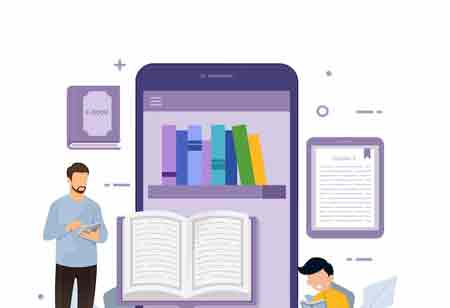THANK YOU FOR SUBSCRIBING
Be first to read the latest tech news, Industry Leader's Insights, and CIO interviews of medium and large enterprises exclusively from Education Technology Insights
Why Digital Literacy Must Be a Core Component of K–12 Learning
In a world where technology influences every aspect of life, digital literacy is no longer optional. It is a fundamental requirement for K-12 students, shaping their ability to adapt, innovate, and succeed in the future.

By
Education Technology Insights | Monday, November 24, 2025
Stay ahead of the industry with exclusive feature stories on the top companies, expert insights and the latest news delivered straight to your inbox. Subscribe today.
FREMONT, CA: In today’s fast-changing technological landscape, digital literacy is a vital skill for individuals of all ages. For K–12 students, it is now essential for success in the 21st century. Digital literacy empowers students to navigate technology confidently, think critically, communicate effectively, and collaborate efficiently in an increasingly digital and interconnected world.
The Importance of Digital Literacy for K-12 Students
Digital literacy has become an essential skill for K-12 students, preparing them to thrive in an increasingly technology-driven world. It plays a crucial role in future career readiness, equipping students with the digital competencies needed to succeed in a job market that spans diverse industries. Beyond career preparation, digital literacy enhances education by making learning more engaging, interactive, and personalized. Through digital tools, students can access vast online resources, collaborate with peers, and create innovative projects, fostering a dynamic and inclusive learning experience.
In addition to its academic benefits, digital literacy promotes critical thinking and problem-solving skills, enabling students to analyze information effectively and address challenges creatively. It also facilitates communication and collaboration, both within classrooms and in broader communities. Equally important is the role of digital literacy in teaching digital citizenship. By understanding online safety, privacy, and ethical behavior, students can navigate the digital world responsibly and safeguard themselves and others from cyberbullying, misinformation, and other online threats.
Strategies for Fostering Digital Literacy in K-12 Education
Fostering digital literacy in K-12 education requires a structured approach from schools and educators. One effective strategy is integrating technology into the curriculum across all subjects, ensuring students gain hands-on experience with digital tools in various contexts. Teacher training is another critical element; educators must have the knowledge and skills to use technology effectively in their classrooms.
Creating a supportive learning environment is equally important. Students need access to reliable devices, high-speed internet, and technical support to maximize their learning potential. Schools must also prioritize teaching digital citizenship, emphasizing online safety, privacy, and responsible digital behavior. Developing essential skills such as critical thinking, problem-solving, communication, and collaboration is key to preparing students for the digital world. Encouraging creativity and innovation through technology further enhances students’ ability to think independently and produce original work. Finally, engaging parents and the wider community can provide additional support and resources to bolster students' digital literacy.
The Role of Parents and Guardians
Parents and guardians play a vital role in their children's journey toward digital literacy. Setting reasonable limits on screen time and monitoring online activities helps create a healthy digital balance. Parents can demonstrate positive behaviors for their children to emulate by modeling responsible and ethical use of technology. Open communication about online safety, privacy, and cyberbullying fosters trust and ensures children feel supported in navigating digital experiences.
Families can also benefit from exploring technology, learning new skills, and sharing digital experiences. Utilizing parental controls to filter inappropriate content and monitor children’s online activities adds another layer of safety. Ultimately, the collaboration between schools, parents, and communities is essential to equip students with the digital literacy skills necessary for academic, personal, and professional success.
Digital literacy extends beyond the mere use of technology; it focuses on equipping students to become responsible and informed digital citizens. By emphasizing digital literacy within K-12 education, educators can effectively prepare students for a successful and fulfilling future in an increasingly technology-driven world.







